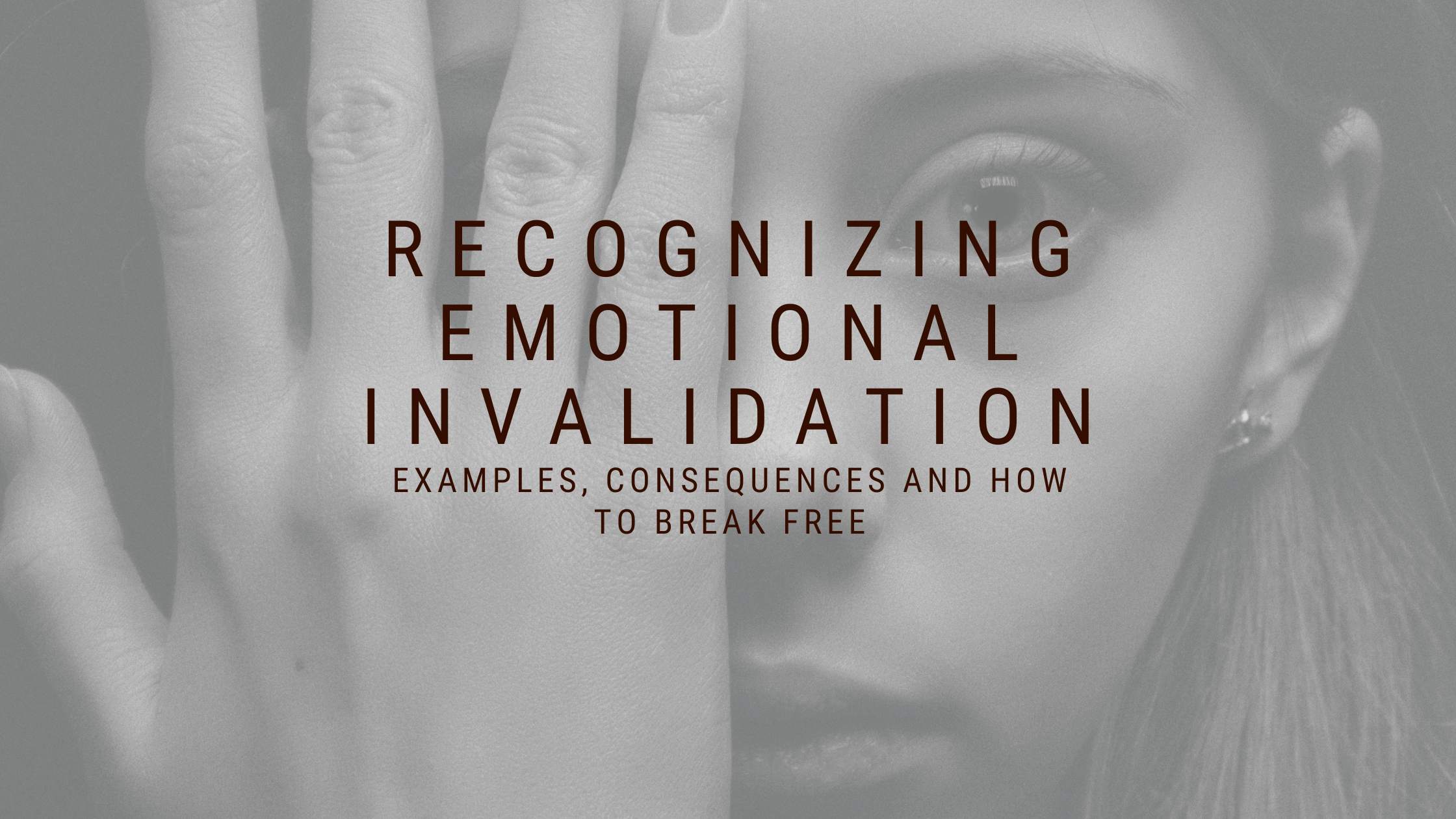Feelings Dismissed – How to Spot Emotional Invalidation

In this article, I will discuss emotional invalidation—often used by abusers as a way to reject, ignore, or belittle their partner’s feelings and emotions within a relationship characterized by psychological abuse. This behavior not only undermines a person’s emotional experience but also erodes their ability to express themselves freely within the relationship.
Emotional invalidation is a form of emotional manipulation that, although it may seem less overt than physical or verbal abuse, is equally damaging. It gradually leads the victim to doubt their own perceptions and emotionally submit to the abuser’s control.
Emotional invalidation, therefore, is an insidious form of abuse often underestimated, as it progressively undermines one’s ability to recognize and affirm their own feelings. This can lead to devastating psychological and physical consequences, making it even harder for the victim to see the toxic dynamic and seek help. Understanding and addressing this phenomenon in relationships is crucial.

What is Emotional Invalidation?
Emotional invalidation occurs when a person’s feelings and emotions are systematically minimized, ignored, or ridiculed.
This behavior is common in relationships where psychological abuse is present, with the abusive partner dismissing the victim’s emotional experiences and denying the legitimacy of their feelings.
Phrases like “You’re overreacting,” “You’re too sensitive,” or “You shouldn’t feel that way” are typical examples of invalidation. This tactic can also be subtler, such as changing the subject when the other person expresses distress or ignoring them altogether.
Although it may seem subtle, this practice progressively undermines the victim’s trust in their own emotions, making them feel inadequate or irrational.
Over time, invalidation creates an environment where one feels they must suppress their feelings to avoid judgment or ridicule. This often invisible mechanism is a powerful tool for control and manipulation, weakening the victim and making them increasingly dependent on the abuser to define their emotional reality.
Common phrases
Here is a list of common phrases used by abusive partners to make the victim doubt their own emotions and perceptions, often leading them to repress their feelings and feel shame or guilt for expressing them:
- “You’re just imagining things.”
- “You’re always so dramatic.”
- “There’s nothing to worry about; you’re exaggerating.”
- “Why can’t you just be happy with what you have?”
- “You’re too sensitive; it was just a joke.”
- “It wasn’t that serious; calm down.”
- “You misunderstood everything; that’s not what I meant.”
- “The problem is you reacting this way.”
- “You can’t take everything personally.”
- “Don’t play the victim; it’s not all about you.”
- “You’re just looking for attention.”
- “You shouldn’t feel that way; there’s no reason to.”
- “If you really loved me, you wouldn’t think these things.”
- “That’s your version, but that’s not how it happened.”
- “I don’t understand why you always have to complicate everything.”
- “You’re always making up problems that don’t exist.”
- “You have nothing to complain about; you have everything.”
- “You get upset over stupid things; you should grow up.”
- “You feel this way because you’re insecure.”
- “Your problem is you never know how to let go.”
Abusers often end conversations abruptly, leaving the victim unable to express themselves or process their emotions, using phrases like:
- “End of discussion.”
- “I don’t want to hear anything more.”
- “Don’t start.”
- “There’s nothing to say.”
- “Stop it.”
- “That’s enough.”
- “None of your business.”
- “Don’t make a fuss.”
- “Are you done?”
- “You’re exhausting.”
- “I’m not discussing this.”
- “It’s not the right time.”
- “I don’t have time for this.”
- “You’re boring.”
- “That’s the end of it.”
- “Why do you always have to do this?”
- “It’s not worth talking about.”
- “It’s pointless.”
- “Not my problem.”
- “I’ve already said everything.”
These phrases are intended to shut down dialogue and silence the victim, making their emotions and opinions seem irrelevant or irritating.

Emotional Invalidation as a Tool of Manipulation
Purpose of Emotional Invalidation
In an abusive relationship, emotional invalidation often serves a clear purpose: to destabilize the victim and diminish their ability to assert their feelings.
By constantly dismissing the other person’s emotions, the abuser creates an environment where the victim begins to doubt their perception of reality. This makes it difficult for them to recognize the ongoing abuse and manipulation, leading them to develop an emotional dependence on the abuser for validation of what is right or wrong. This cycle of doubt and insecurity can make the victim increasingly vulnerable to psychological control.
Creating Dependence and Insecurity
Emotional invalidation not only erodes the victim’s self-esteem but also fosters a strong emotional dependence on the abuser. Confused and lacking emotional reference points, the victim begins to seek the abuser’s approval for the very emotions they feel. This process renders the victim increasingly insecure and dependent, as they come to believe they are incapable of managing their emotions on their own. Through this, the abuser gains even more control, creating a vicious cycle that is challenging to break.
The Cycle of Abuse
Emotional invalidation is often an integral part of a broader cycle of psychological abuse, in which the abuser alternates between moments of criticism or devaluation and brief episodes of affection or apparent kindness. This oscillation creates confusion in the victim, who clings to the positive moments, hoping for lasting change. However, the abuser soon resumes manipulative behavior, reinforcing their psychological control. This cycle of emotional highs and lows further weakens the victim’s ability to recognize the abuse and escape from it, as they feel trapped in a dynamic that seems to promise a redemption that never comes.
Effects on Self-Esteem and Identity
As noted above, emotional invalidation has a devastating impact on the victim’s self-esteem. When our feelings are consistently belittled or ignored, we begin to internalize the idea that our emotions are neither valid nor important. This progressively weakens our confidence in ourselves and our ability to make emotional decisions.
Over time, we may start to believe that our perceptions are wrong or exaggerated, losing touch with our sense of self and identity. In an abusive context, the abuser exploits this insecurity to shape the victim’s self-image, making them increasingly vulnerable and malleable. As a result, the victim may come to rely entirely on the abuser to define their worth, further weakening their identity and making it harder to break free from the cycle of manipulation.

The Psychological and Physical Consequences of Emotional Invalidation
Anxiety and Depression
One of the primary psychophysical consequences of emotional invalidation is an increase in anxiety and depression. When a person’s emotions are consistently ignored or devalued, the victim begins to doubt the legitimacy of their feelings, developing a profound sense of insecurity. This fosters chronic emotional tension, which can lead to anxiety disorders, panic attacks, and depressive symptoms.
The feeling of not being heard or understood can amplify a sense of isolation and hopelessness, leaving the victim feeling trapped in a reality that seems to stifle any chance for expression or relief.
Chronic Stress and Physical Health Issues
Prolonged emotional invalidation can result in chronic stress buildup, which also has severe physical consequences.
The body responds to emotional stress by constantly activating the sympathetic nervous system, leading to symptoms such as muscle tension, headaches, gastrointestinal issues, and difficulty breathing.
Unprocessed stress, stemming from the continuous denial of one’s emotions, can weaken the immune system, increasing vulnerability to illnesses and infections. The mind-body connection is strong, and ignoring the emotional impact of abuse can contribute to a deterioration in overall health.
Long-Term Mental Health Deterioration
If emotional invalidation persists over time, the long-term mental health consequences can be severe and enduring. The victim may develop conditions like complex post-traumatic stress disorder (C-PTSD), characterized by flashbacks, difficulty regulating emotions, and memory problems. Over time, the constant denial of emotions can lead to emotional disconnection, making it hard for the victim to understand and recognize their own feelings. This mental health deterioration not only affects the quality of life but also makes it extremely challenging for the victim to recognize the abuse and break free from the cycle.

Why Invalidation is Dangerous: The Risk to Psychophysical Well-Being
The Spiral of Vulnerability
Emotional invalidation creates a downward spiral, making the victim increasingly vulnerable to further forms of abuse.
When feelings and emotions are constantly denied or minimized, the victim begins to doubt their own judgment, gradually losing confidence. This weakening of emotional awareness leads to growing isolation, as the victim feels unable to express themselves or seek help.
The more the abuser invalidates their emotions, the more dependent the victim becomes on the abuser’s judgment, incapable of questioning abusive behaviors.
The loss of emotional autonomy is one of the most insidious effects of invalidation, as it opens the door to increasingly severe forms of control,
including psychological manipulation, threats, and more explicit forms of abuse.
The Threat to Mental and Physical Health
This point has been mentioned above, but it’s worth exploring further as it is one of the most concerning aspects of emotional invalidation—the devastating impact on the victim’s mental and physical health.
In the long term, chronic invalidation can lead to severe disorders, such as post-traumatic stress disorder (PTSD). Victims may experience flashbacks, dissociation, and a constant state of hypervigilance, all manifestations of unprocessed psychological suffering.
Additionally, living in a state of continuous stress weakens the immune system, increasing vulnerability to chronic physical health issues such as cardiovascular problems, gastrointestinal issues, and stress-related conditions like migraines and insomnia.
Unmanaged emotional stress has a cumulative effect that progressively compromises general well-being, making the victim even more fragile and susceptible to the abuser’s control.
The Importance of Recognition
Recognizing emotional invalidation as a form of abuse is essential to breaking this destructive cycle. Often, we are unaware of the damage that invalidation is causing to our psychophysical health, as the abuser makes us feel irrational or exaggerated in our feelings. However, understanding that our emotions are valid and deserve respect is the first step toward healing. Seeking professional psychological support can help rebuild self-esteem and develop strategies to leave the abusive relationship. Only through awareness and appropriate support is it possible to interrupt the cycle of invalidation and begin a path to mental and physical recovery.
“The ability to perceive and value our emotions is essential for an authentic and meaningful life.”
Carl Rogers
How to Recognize Emotional Invalidation in a Relationship
Recognizing the signs of emotional invalidation in a relationship is crucial for understanding if you might be experiencing psychological abuse.
Common indicators include:
- Frequent phrases from the partner that downplay your feelings, such as ”You’re overreacting” or “It’s not that big of a deal.” These statements leave the person feeling irrational or overly sensitive.
- A lack of empathy, where the partner shows no interest in understanding your emotions, often changing the subject or reacting with irritation when you try to share your feelings.
- Consistent rejection of emotions, where the partner openly refuses to acknowledge the legitimacy of your feelings, downplaying or ignoring them entirely.
Each of these behaviors serves to exercise emotional control, leading the victim to doubt themselves and question the validity of their own emotions.
Difference between healthy conflict and invalidation
It is important to distinguish between healthy conflict within a relationship and emotional invalidation.
All couples, even the most close-knit ones, can have disagreements and arguments, but the difference lies in the way emotions are handled. In a healthy conflict, both parties respect and consider each other’s feelings, even when there are differing opinions. The goal of constructive conflict is to find a compromise or mutual understanding, based on empathy and respect.
In contrast, in emotional invalidation, one partner systematically nullifies, ignores, or minimizes the other’s emotions. Instead of resolving conflicts, invalidation reinforces a power imbalance, in which the victim’s emotions are made irrelevant or even ridiculed, leaving them without a voice in the relationship.

Breaking Free from Psychological Abuse and Reconnecting with Your Emotions
Paths to Healing
Leaving an emotionally abusive relationship is challenging but essential to restoring emotional well-being.
The first step is often reaching out to trusted friends who can provide support and understanding. Talking about your experiences with someone you trust can help ease the burden of pain and isolation. Seeking a therapist specialized in psychological abuse can also be invaluable; they can guide you through the healing process and help you work through traumatic experiences. Support groups are another precious resource where survivors can share their stories, receive practical advice, and build a network of solidarity that encourages them to keep moving forward in their journey to recovery.
Rebuilding Self-Esteem
Rebuilding self-confidence is vital for emotional recovery after abuse. One effective way to do this is through self-awareness, which involves taking time to reflect on your thoughts and feelings without self-judgment.
Reaffirming your self-worth is crucial;
survivors must remind themselves that they deserve respect and love, regardless of past experiences.
Additionally, rediscovering personal interests and passions can help strengthen a sense of self. Engaging in activities that bring joy and fulfilment helps reignite a sense of accomplishment and contributes to building a positive self-image.
The Role of Emotional Awareness
Emotional awareness is a cornerstone in the recovery process. Learning to once again recognize and respect your own emotions is vital to regaining a sense of identity separate from the abuser.
Survivors must practice listening to their feelings without fear of judgment or invalidation. Developing this awareness not only aids in processing past trauma but also lays the foundation for healthier, balanced future relationships. The ability to recognize and communicate emotions encourages more genuine and satisfying interactions, breaking the cycle of abuse and fostering connections built on respect and empathy.

Conclusion
Emotional invalidation is a form of psychological abuse that often goes unnoticed but has devastating consequences for a victim’s well-being.
We have explored how this practice can undermine self-esteem, distort identity, and cause severe psychological and physical effects.
It is essential to recognize these signs and understand that
the dismissal of your feelings is never acceptable.
Emotional invalidation must be taken seriously, as it can lead to a cycle of abuse that’s hard to break without the right support.
A Message of Hope
Despite the pain and emotional scars that may result, it’s important to remember that healing is possible. Taking back control of your emotional life requires time, patience, and the right support, but every step forward is a step toward a more authentic and fulfilling life.
To anyone facing a similar situation, know that you don’t have to go through this journey alone. Seek help from trusted friends, professionals, or support groups.
Remember, you deserve to be heard, respected, and loved.
Your voice matters,
and you can write new chapters in your life filled with hope and resilience.
Thank you for reading this post! Feel free to share your thoughts and ideas in the comments, and consider sharing with friends who might benefit.

Risources:
- “Emotional Blackmail: When the People in Your Life Use Fear, Obligation, and Guilt to Manipulate You” by Dr. Susan Forward.
- “The Verbally Abusive Relationship: How to Recognize It and How to Respond” by Patricia Evans.
- “Perceived Emotion Invalidation Predicts Daily Affect and Stressors”, Melissa J Zielinski, Jennifer C Veilleux, Marley F Fradley, Kayla D Skinner.
- “The Perceived Invalidation of Emotion Scale (PIES): Development and Psychometric Properties of a Novel Measure of Current Emotion Invalidation”, Melissa J Zielinski, Jennifer C Veilleux.
